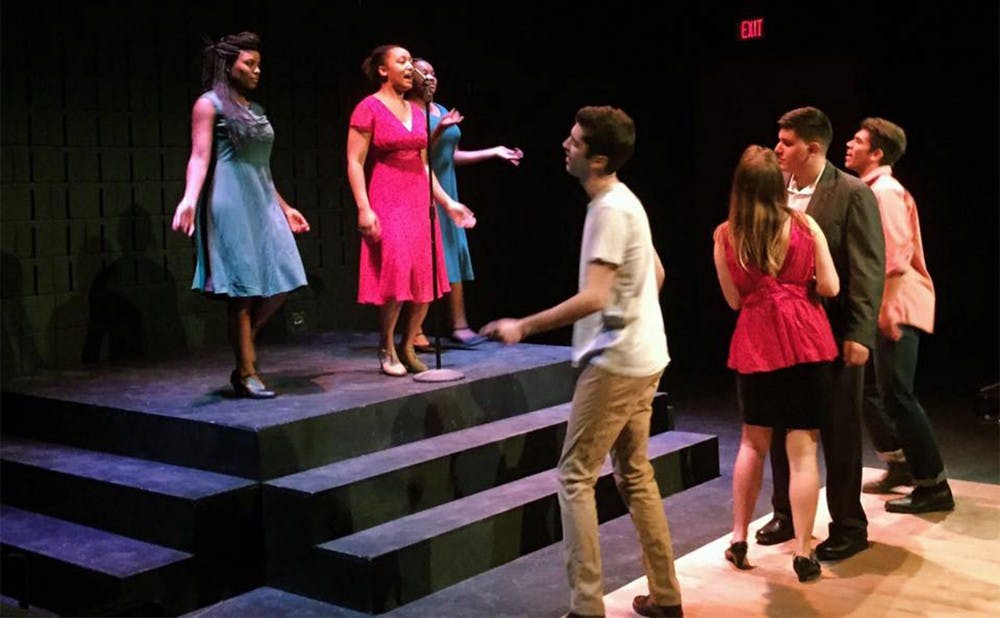Hoof ‘n’ Horn’s production of “Violet,” a musical set in the Civil Rights-era South that takes on themes of race, gender and politics, opened last Thursday—the night before an inauguration ceremony that capped off an election season marked by racism and sexism.
The significance of this timing was not lost on director Zack Fowler, Trinity ‘16. During the first week of rehearsals back in November, he reminded the cast that the musical takes place within months of the 1964 burning of a black church in Mississippi that presaged the infamous murder of three civil rights workers. He asked if anyone could name the last instance of a racially-motivated church burning.
As it turns out, it was that week, referring to the November burning of a Mississippi church.
“So fifty years later, events were no different,” Fowler said.
Bringing out those modern parallels in the musical—which premiered off-Broadway in 1997 as an adaptation of Doris Betts’ short story “The Ugliest Pilgrim”—was a constant challenge for Fowler and the rest of the student-run theater group.
“We’re dealing with two very different times, and yet there’s so many common threads, and it’s hard to make those connections,” producer Tori Trimm said. “[We]’ve stayed true to the story while, at the same time, bringing more out of it than I would have expected after our first read-through.
The story follows Violet, a young, white woman from the isolated town of Spruce Pine, N.C., played by sophomore Bekah Wellons. A facial disfigurement, by way of an axe-inflicted wound the audience never actually sees, drives Violet’s cross-country quest for a new face and a new identity. She hops on a Greyhound bus for Tulsa, O.K., hoping to meet a miracle-working televangelist—the only person, she is convinced, who can rid her of her scar.
Along the way she develops relationships with two soldiers: Flick, played by senior Alex Brunson, whose experience as a black man in the South lends a voice of maturity to Violet’s naive struggles with appearance, and Monty, played by Ben Allen, Trinity ‘16, whose swaggering arrogance belies his vulnerability. Interspersed with the travel scenes are vignettes from Violet’s childhood, which shed light on her complicated relationship with her father and reflect the nonlinear storytelling of Betts’ original text.
Flick deals more subtly with Violet than does Monty, exchanging glances where his loudmouthed companion trades barbs, displaying genuine acts of kindness where his friend is anything but. Thus, Violet’s respective relationships with the two men develop equally, if differently. But inevitably, their interactions are not untainted by race: Despite having a higher rank than Monty, Flick, at least initially, gets less respect from Violet.
As the characters make their way from Spruce Pine to Nashville to Memphis and beyond, the music reflects their surroundings, running the gamut from typical show tunes to country swing to Holy-Ghost-summoning gospel. For music director Adam Beskind, the pit musicians and the actors, this wide variety presented a challenge, but all agreed that it was a unique feature of the musical.
“That’s something I’ve really latched onto in the show—the power of music to move the audience even though it comes from different genres, even though it takes place in a different location geographically,” Brunson said. “It’s just as enjoyable and does just as much to advance the plot despite, or perhaps because of, the diversity.”
Early on in the production, Hoof ‘n’ Horn had the opportunity to speak with Ilana Ransom Toeplitz, assistant director of the original 2014 Broadway production of “Violet." Told to form their own opinions on the script, the cast and crew found they in fact had some problems with it. To them, the original production did not say enough when it came to issues of race and gender.
“If someone says, ‘take your own spin,’ and then you disagree with what they say, that’s a good thing,” Fowler said.
This incarnation of “Violet,” then, is very much Hoof ‘n’ Horn’s own. Of course, the production remains true to the original script—law forbids otherwise—but elements as obvious as casting choices and as minute as vocal intonations have helped bring out the depth in a musical that originally wrote in only two characters of color despite purporting to tackle sensitive social issues.
The idea of intentionalism, that every message would be very purposefully said or left unsaid, no detail or production choice an accident, drove their approach to the production.
“There’s an easy narrative to tell here and there’s a hard narrative to tell,” Fowler said. “The easy narrative is Flick and Violet connect over the fact that their experiences are tied by their appearances. … The harder narrative to tell is what we’ve really been working for months on, which is, what does it look like to deal with self-worth that derives from appearance? What does it look like to look for validation in faith, or to look for validation in family history? What does it look like to deserve or not deserve that validation?”
By performing the musical in the intimate Sheafer Theater, Hoof ‘n’ Horn invites the audience to discuss these narratives. After Sunday’s show, Fowler directed a short “talkback” session where he opened the floor to audience members to reflect on the musical’s themes.
In its 80th season, Hoof ‘n’ Horn delivers a story of an era when injustice and prejudice were all too common—and whose messages remain just as relevant today.
In its second week, “Violet” runs Jan. 26-28 at 8:00 p.m. and Jan. 29 at 2:00 p.m. in Sheafer Theater. Tickets are $10 for students and seniors and $15 at regular price and can be purchased online at tickets.duke.edu.
Get The Chronicle straight to your inbox
Sign up for our weekly newsletter. Cancel at any time.

